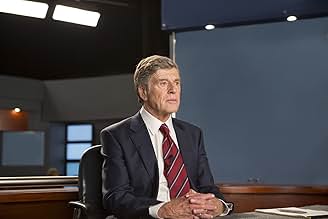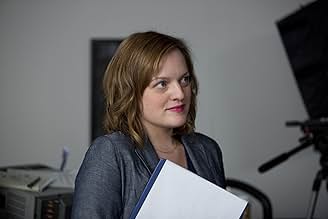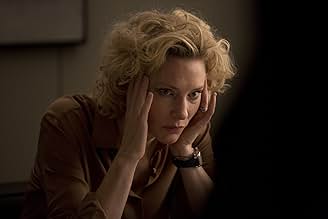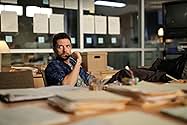Drame journalistique relatant l’enquête de 2004 menée par CBS sur le service militaire de George W. Bush et les critiques qui ont coûté la carrière du présentateur et du réalisateur.Drame journalistique relatant l’enquête de 2004 menée par CBS sur le service militaire de George W. Bush et les critiques qui ont coûté la carrière du présentateur et du réalisateur.Drame journalistique relatant l’enquête de 2004 menée par CBS sur le service militaire de George W. Bush et les critiques qui ont coûté la carrière du présentateur et du réalisateur.
- Réalisation
- Scénario
- Casting principal
- Récompenses
- 1 victoire et 6 nominations au total
Avis à la une
In 2004, Mary Mapes brought in her team to dig into the rumors that President George W Bush had received preferential treatment in military assignments and that his military service records were either incomplete, had been altered, or proved that he did not fulfill his service requirements. Ms. Mapes professional relationship with Dan Rather allowed her to bring him into the fold, and resulted in significant air time on CBS and "60 Minutes". Most of us know how this saga ended Mapes and her team were let go, and Mr. Rather's time as the network news anchor was unceremoniously ended. While there may very well be substance to the story they were chasing, both the book and the movie act as Ms. Mapes defensive pleas of innocence.
In the film, Cate Blanchett plays Mary Mapes, and Robert Redford plays Dan Rather. Ms. Blanchett, as usual, is exceptional; and Redford is solid in capturing the essence of Rather (though the hair color variances are distracting). The other key players are: Topher Grace as reporter Mike Smith, Dennis Quaid as researcher and former Marine Lt. Colonel Roger Charles, Elisabeth Moss as Lucy Scott, Bruce Greenwood as Andrew Heyward (President of CBS News), Stacy Keach as Mapes source Lt. Colonel Bill Burkett, and Dermot Mulroney as CBS attorney Lawrence Lampher. The film is well cast, but it's not enough to make up for the weak script and the less-than-stellar direction from first timer James Vanderbilt (who did write the screenplay for Zodiac, and is the great-grandson of Albert G Vanderbilt).
Rather than provide any proof that the story was properly documented and confirmed, Mapes and Rather decry the loss of reporters who ask the "tough" questions. Their defense seems to be that they were brave enough to chase the story and ask questions. A sequence is included that positions these two as the last bastions for true news reporting, and that these days news organizations are more concerned with profits and ratings, than breaking a story. This argument conveniently omits the fact that information flows much more freely today than in "the good old days". The actions of politicians and industry leaders are constantly being questioned and scrutinized by the endless stream of bloggers and reporters – both amateurs and professionals. There is no shortage of questions being asked, and the ease with which accusations are leveled actually fits right in with the Mapes approach.
The frustrating part of the movie is that it's a missed opportunity to detail how "legitimate" news organizations go to extremes to document and verify their information and sources, and this is where Ms. Mapes' team fell short. Without intending to, the film plays more similar to Shattered Glass (2003) than All the President's Men (1976) getting a story being more important than proving a story. We are left with the feeling that Ms. Mapes believes asking a question is more important than proving the facts. The cringe-inducing shot of Dan Rather's final broadcast leaves the viewers with the impression that the objective of the film was to place Mapes and Rather on a pedestal of righteousness. The only thing actually confirmed here is that heads rolling at CBS was the right (and only reasonable) call.
"Truth" tells an intense story, and it captivates my attention throughout. Mary is passionate about her work, and yet she stumbles upon the wrong story to report. I feel so sorry for her and her colleagues for having worked on such an explosive story, that would backfire on them no matter whether the documents were true or not. Mary is right in saying that when the noise is so loud, people forget what the original purpose is about. That is the one sad truth highlighted in this fascinating and engrossing story.
Every journalism student should see Truth, a true version of a true event that included liberal CBS; liberal anchor, Dan Rather (Robert Redford); and liberal producer for 60 minutes, Mary Mapes (Cate Blanchett). The latter two sacrificed their jobs possibly for the ideal of bringing down George W. Bush in his campaign to become president for the second time.
The journalists thought they had a story about Bush slacking in his National Guard tour, but what they had was forged documents that eventually cost them their jobs and credibility. Mapes was the prime agent of the fiasco, pushing to get a story on 60 Minutes when it was too close to deadline and more substantiation was needed for the source and his documents.
First-time director and seasoned-writer James Vanderbilt takes an almost cool approach, not quite as weighty as All the President's Men or as frenetic; the journalists young and old struggle with the profession's verity: Vet your stories and your sources until they bleed truth. Mapes and her vigilantes are up against a deadline, so more verifying of documents and sources is not possible. Thus, they should not have run with the story, but they did. Dan Rather, for all his experience as CBS news anchor, should not have trusted in Mapes' research, but he did.
Most of all they should not have trusted Lt. Colonel Bill Burkett (Stacy Keach), who provided the documents purporting to show Bush's slacking. Because Burkett was a known liar and fervent Kerry supporter, no one should have trusted him before corroborating his information. Journalism students, beware of cutting corners on the road to truth. The film is an excellent primer on best practices.
Truth is a classy, almost unbiased rendition of a true story, an entertaining thriller filled with first-rate actors. If there is one flaw, I submit for your consideration that the film is too reverent of Mapes and Rather, who made a blunder unworthy of their status and experience. They are more heroic than they deserve. As cautionary players on the big media stage, they are the finest examples of flawed human beings.
"I think journalism gets measured by the quality of information it presents, not the drama or the pyrotechnics associated with us." Bob Woodward
Le saviez-vous
- AnecdotesThe movie was shot in Australia at Cate Blanchett's request, as she wanted to be close to her family while filming.
- GaffesThe movie timeline shows June 2004 and Mary Mapes is meeting with Josh Howard and Mary Murphy. She describes Bill White as a "business man" in Houston. Bill White was the MAYOR of Houston. (as of January 2004.)
- Citations
Mary Mapes: Do you know what it would take to fake these memos?
Dick Hibey: Mary...
Mary Mapes: No, this is important. It would require the forger to have an in-depth knowledge of the 1971 Air Force manual, including rules and regulations and abbreviations. He would have to know Bush's official record front to back to make sure none of these memos conflicted with it. He would have to know all of the players in the Texas Air National Guard at the time, not just their names, but their attitudes, their opinions including how they related to one another. He would have to know that Colonel Killian kept personal memos like this for himself in the first place. He would have to know how Killian felt at the time particularly about his superiors and then First Lieutenant Bush. He would have to know or learn all of this in order to fool us as you assume he did. Now... Do you really think that a man who takes this kind of time and precision, then goes and types these up on Microsoft Word?
[Small pause]
Mary Mapes: Our story was about whether Bush fulfilled his service. Nobody wants to talk about that. They wanna talk about fonts and forgeries and conspiracy theories, because that's what people do these days if they don't like a story. They point and scream. They question your politics, your objectivity, hell, your basic humanity. And they hope to God the truth gets lost in the scrum. And when it is finally over and they have kicked and shouted so loud, we can't even remember what the point was.
- Crédits fousWilliam Devane as the voice of Gen. Hodges on the telephone is not listed in the cast.
- ConnexionsFeatured in Close Up with the Hollywood Reporter: Actresses (2016)
- Bandes originalesString Quartet #1 - Allegro Assai
Written by Wolfgang Amadeus Mozart (as Wolfgang Mozart)
Courtesy of APM Music
Meilleurs choix
- How long is Truth?Alimenté par Alexa
Détails
- Date de sortie
- Pays d’origine
- Sites officiels
- Langue
- Aussi connu sous le nom de
- Conspiración y poder
- Lieux de tournage
- Sociétés de production
- Voir plus de crédits d'entreprise sur IMDbPro
Box-office
- Budget
- 9 600 000 $US (estimé)
- Montant brut aux États-Unis et au Canada
- 2 541 854 $US
- Week-end de sortie aux États-Unis et au Canada
- 66 232 $US
- 18 oct. 2015
- Montant brut mondial
- 5 383 097 $US
- Durée
- 2h 5min(125 min)
- Couleur
- Mixage
- Rapport de forme
- 2.39 : 1






























